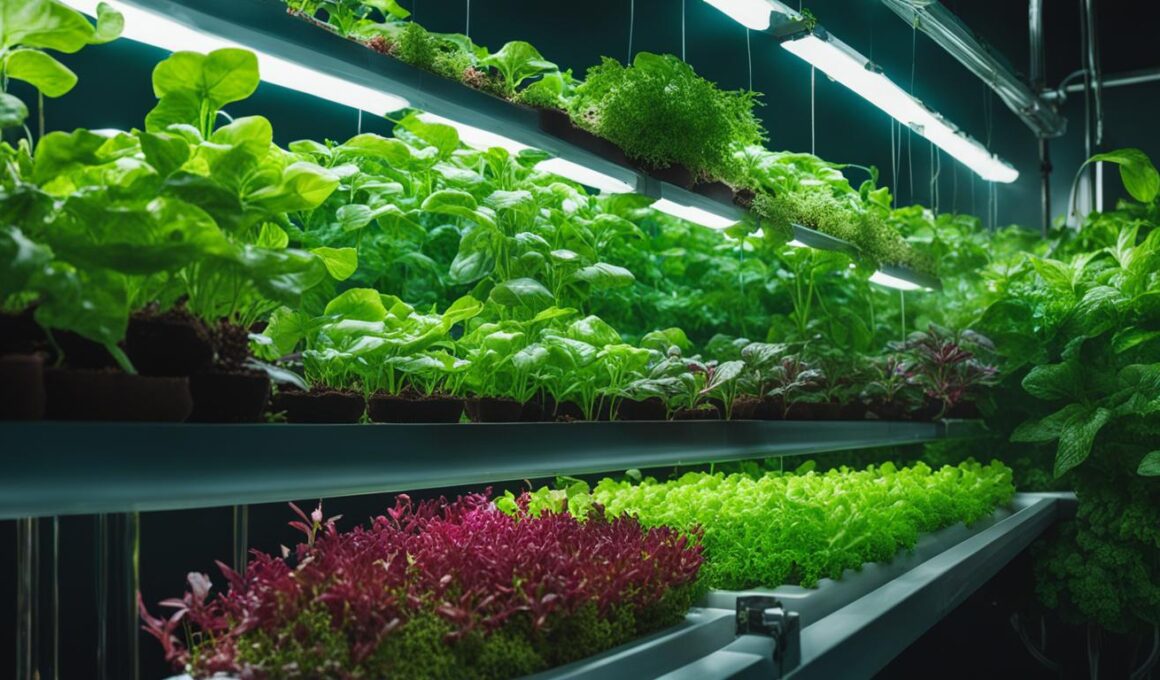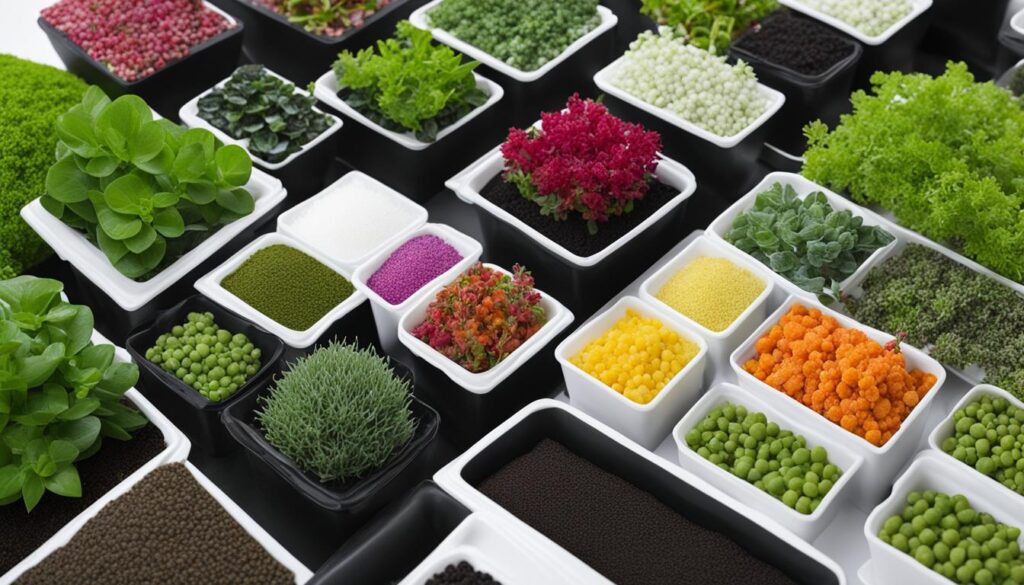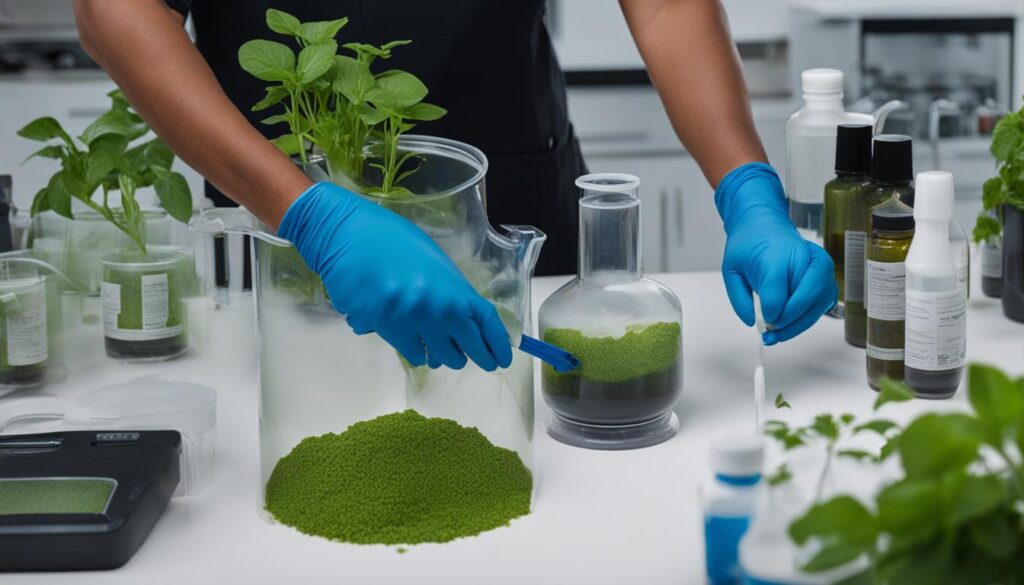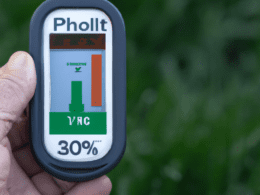Optimal plant health and growth in hydroponic systems rely on a balanced nutrient solution. The key to success lies in providing the right combination of hydroponic nutrients including essential macro and micronutrients. Given the exclusion of soil, hydroponic fertilizers are pivotal for maintaining quick and efficient plant growth. A well-mixed nutrient mix not only promotes the development of strong, healthy plants but contributes to an efficient and productive system. To optimize these benefits, selecting a high-quality water-soluble fertilizer is essential.
Post Summary
- Choose a suitable hydroponic fertilizer based on unique plant requirements and growth stages.
- Deliver essential nutrients like Nitrogen, Phosphorus, and Potassium in easily absorbable form.
- Utilize tailored nutrient solutions for optimal growth and yield.
- Consider both organic and synthetic fertilizer options to determine their compatibility with your hydroponic system.
- Monitor and adjust nutrient levels regularly to maintain optimal plant health and hydroponic performance.
- Opt for water-soluble fertilizers to ensure maximum efficiency and ease of use.
- Successful hydroponic systems are dependent on careful nutrient management and support of plant growth.
Understanding Hydroponic Fertilization and Plant Nutrition
To achieve hydroponic growth success, it is essential to provide plants with essential hydroponic nutrients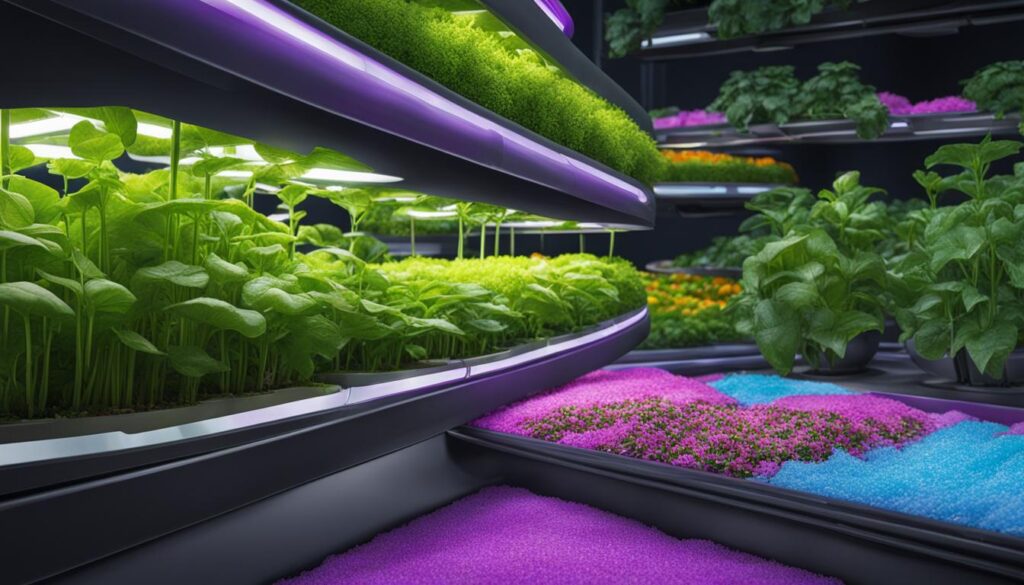
Key Nutrients for Hydroponic Success
Hydroponic systems need an optimal balance of primary macronutrients, secondary nutrients, and micronutrients. The primary macronutrients, which are indispensable for the plants’ healthy growth, include:
- Nitrogen
- Phosphorus
- Potassium
Moreover, secondary nutrients such as Calcium and Magnesium, as well as the micronutrient Zinc, are crucial for supporting various plant functions, from chlorophyll production to root development. Together, these nutrients create a comprehensive plant-specific nutrient requirements package that caters to the needs of plants in hydroponic systems.
Advantages of Tailored Nutrient Solutions
Customized hydroponic nutrients offer substantial benefits by matching specific nutrient needs to plant types and growth stages. Tailored nutrient solutions provide essential elements in the correct ratios, minimizing waste and optimizing resource use. This precision in nutrient delivery not only promotes enhanced growth and healthier plant development but also leads to increased yields and improved overall performance of the hydroponic system.
| Benefits of Customized Hydroponic Nutrients | Examples |
|---|---|
| Optimized nutrient ratios | Providing the ideal nutrient balance for leafy greens vs. fruiting plants |
| Reduced resource waste | Using only the required amount of nutrients, minimizing excess and runoff |
| Better overall plant health and growth | Access to adequate nutrients contributes to stronger roots, stems, and leaves |
| Increased crop yields | Optimal nutrition contributes to higher fruit or vegetable production |
| Enhanced system performance | A well-balanced nutrient solution can reduce the risk of system imbalances and failures |
By selecting tailored nutrient solutions designed with plant-specific nutrient requirements in mind, you can ensure your hydroponic plants thrive and enjoy long-term success in their soilless environment.
Choosing the Right Hydroponic Fertilizer for Your Plants
Selecting hydroponic fertilizers is a crucial step in ensuring the health and growth of your hydroponic plants. The best hydroponic nutrients depend on several factors tailored to the specific needs of each plant species and growth stage. In this section, we will discuss the essential factors to consider when selecting a hydroponic fertilizer and provide guidance on achieving optimal nourishment for your plants.
The first factor to consider when selecting a hydroponic fertilizer is the unique nutritional requirements of each plant species. Each plant has specific macro and micronutrient needs for optimal growth. It is vital to research the plant-specific fertilizers and nutrient ratios that will help ensure your plants’ health and success.
The second factor to consider is the nutrient solubility of the hydroponic fertilizer. The nutrients should be easily dissolvable in water, allowing the plants to absorb them efficiently. Poor solubility can lead to nutrient deficiencies and hinder overall plant growth.
The third factor to consider is the balance of macro and micronutrients. A well-balanced nutrient solution promotes healthy growth and prevents excesses or deficiencies. Accurate nutrient ratios also help prevent potential issues such as nutrient lockout or toxicities.
Finally, consider the compatibility of the fertilizer with your water source. It is vital to ensure that the chosen nutrients are compatible with your water source, as certain elements can react and become unavailable to the plants.
To simplify the process, efficient options such as complete fertilizers can be used. These fertilizers contain adequate macro and micronutrient ratios for most plants, and individual nutrients can be supplemented as needed based on plant and water analysis. This approach ensures that your plants receive optimal nourishment without experiencing any deficiencies or excesses.
Here is a table displaying some popular hydroponic nutrients and their recommended concentrations:
| Plant Species | Nitrogen (ppm) | Phosphorus (ppm) | Potassium (ppm) | Calcium (ppm) | Magnesium (ppm) |
|---|---|---|---|---|---|
| Tomatoes | 200 | 50 | 300 | 200 | 50 |
| Peppers | 150 | 40 | 200 | 150 | 50 |
| Lettuce | 180 | 40 | 250 | 180 | 50 |
By understanding the specific needs of each plant species and growth stage, and considering factors such as nutrient solubility, macro and micronutrient balance, and compatibility with your water source, you can confidently select the right hydroponic fertilizer for your plants, ensuring their health and prosperity in your hydroponic system.
Organic vs. Synthetic Fertilizers for Hydroponics
When it comes to feeding your hydroponic plants, the choice between organic and synthetic fertilizers can significantly impact the sustainability and efficiency of your system. Understanding the benefits and drawbacks of these nutrient sources is essential in determining the best option for supporting robust, eco-friendly hydroponic plant growth.
The Benefits of Organic Nutrient Sources
Utilizing organic hydroponic nutrients brings a multitude of advantages to your hydroponic system. Derived from natural materials such as kelp extract and earthworm castings, organic nutrients support environmentally friendly hydroponics and promote sustainable plant growth. Some key benefits of organic fertilizers include:
- Enhanced plant health: Organic nutrients contain micronutrients beneficial to plant immunity and resistance to pests and diseases.
- Better environmental impact: Organic fertilizers are typically biodegradable and have a lower impact on the environment compared to synthetic alternatives.
- Improved soil and water quality: Organic nutrients promote microbial activity in the nutrient solution, which can lead to better water quality in the hydroponic system.
Synthetic Fertilizers: Pros and Cons for Hydroponic Growth
Synthetic hydroponic fertilizers, on the other hand, offer a concentrated and targeted nutrient supply, boasting high hydroponic nutrient efficiency. However, they may not be the most sustainable choice for environmentally conscious gardeners. Here are some key points to consider:
- Precision and efficiency: Synthetic fertilizers provide specific nutrient ratios and are easily absorbed by plants, ensuring utmost efficiency in plant growth.
- Control over nutrients: Synthetic options allow full control over which nutrients are provided, making it easier to tailor your feeding schedule to specific plants.
- Potential for environmental issues: Overuse of synthetic fertilizers can lead to salt accumulation, which can harm plants and negatively impact the environment.
| Organic Fertilizers | Synthetic Fertilizers |
|---|---|
| Environmentally friendly | Precision nutrient supply |
| Sustainable plant growth | High nutrient efficiency |
| Improved plant immunity | Potential environmental concerns |
In conclusion, the choice between organic and synthetic hydroponic fertilizers depends on your gardening goals and priorities. For those seeking to minimize their environmental footprint, organic nutrients offer a more sustainable and eco-friendly option. On the other hand, synthetic fertilizers provide an efficient and targeted solution for accelerating plant growth. Consider the individual needs of your hydroponic plants and weigh the advantages and drawbacks of each option to make an informed decision regarding the best nutrient source for your garden’s success.
Application Tips for Hydroponic Fertilizers
To ensure the success of your hydroponic garden, it’s essential to create the perfect hydroponic nutrient mix and to regularly monitor and adjust nutrient levels to maintain optimal plant health. In this section, we will cover practical guidelines for preparing nutrient solutions and making necessary adjustments.
Creating the Perfect Nutrient Mix
To create the perfect nutrient mix for your hydroponic system, you must combine fertilizers accurately based on the specific needs of your plants and the existing nutrients in the water supply. This involves calculating the appropriate concentrations of each nutrient element while considering factors such as solubility and compatibility. For convenience, you can choose pre-formulated fertilizer programs or use recipes from reliable sources, which ensure that all essential elements are present in the correct proportions.
Begin by following these steps:
- Identify the specific nutrient requirements of your plants.
- Test your water supply to determine its existing nutrient content.
- Select a suitable fertilizer based on your plants’ needs and the results of your water analysis.
- Calculate the appropriate concentration of nutrients for each element, taking into account solubility and compatibility.
- Mix the nutrients, making sure to thoroughly dissolve the fertilizers in water before adding them to your hydroponic system.
Regular Monitoring and Adjusting of Nutrient Levels
Periodically monitoring plant health and the nutrient levels in your hydroponic system is vital for maintaining optimal plant growth and health. Regular testing of the nutrient solution and plant tissues can help identify imbalances or deficiencies, allowing for timely adjustments. As a hydroponic grower, you should be prepared to alter the concentration of individual nutrients within the solution, ensuring that plants have access to all necessary elements throughout their growth cycle.
Consider the following tips for monitoring and adjusting hydroponic nutrients:
- Test the nutrient solution at least once a week with a digital nutrient meter or test kit.
- Observe plant growth and overall health, watching for signs of nutrient deficiencies or imbalances, such as poor growth, discoloration, or wilting.
- Adjust nutrient concentrations as needed based on your test results, adding nutrients or diluting the solution to achieve the correct balance for your plants.
- Consider conducting periodic plant tissue analysis to verify nutrient uptake and identify any hidden deficiencies.
- Keep a record of your nutrient adjustments and plant responses to better understand your plants’ needs and improve your future nutrient management practices.
By accurately preparing nutrient solutions and consistently adjusting hydroponic nutrients in response to plant growth and system conditions, you can effectively promote the health and productivity of your hydroponic garden.
What Type of Fertilizer Should I Use to Start My Hydroponic Plants Successfully?
When starting hydroponic plants successfully, it’s important to choose the right fertilizer. Look for a balanced nutrient solution specifically designed for hydroponic systems. Consider factors like the plant type, growth phase, and water quality when selecting the fertilizer to ensure healthy and thriving plants.
Conclusion
Successful hydroponic gardening depends on the careful management of hydroponic nutrient solutions. By providing the right balance of macro and micronutrients for optimal growth, you will ensure the vitality and yield of your hydroponic crops. One of the most important aspects of hydroponic nutrient management is understanding the unique nutritional requirements of each plant species and growth stage and selecting the right hydroponic fertilizer to match these needs.
Whether you choose organic or synthetic nutrient solutions, regular monitoring and adjustments based on plant uptake and environmental conditions play a critical role in your hydroponic system’s success. Periodic testing of nutrient solutions and plant tissues can identify imbalances or deficiencies, allowing for timely adjustments in concentrations of individual nutrients. This attention to detail ensures that your plants have access to all essential elements throughout their growth cycle.
With the appropriate knowledge and resources, even novice hydroponic enthusiasts can achieve healthy, thriving plants in their systems. As you continue to hone your hydroponic gardening skills, you’ll discover the most efficient and sustainable methods for providing your plants with the nutrients they need to flourish. In doing so, you’ll be well on your way to reaping the rewarding results of a successful hydroponic garden.





